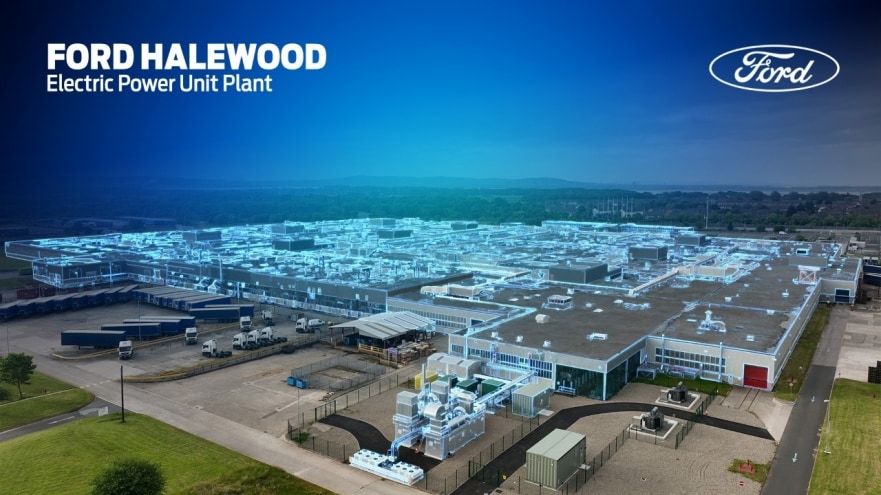Vehicle manufacturer Ford is investing £125 million in its manufacturing hub in Halewood, Merseyside, as it looks to make the North-West a centre of excellence for electric vehicle (EV) production in Europe.
The company has doubled down on its commitment to the UK as its European hub for electric vehicle powertrain production, thanks to £600 million of backing from UK Export Finance, supporting high-skill manufacturing jobs.
The investment is part of government’s plans to put the UK at the forefront of electric car development in Europe as the country transitions to net zero.
Ford has received support from UKEF through its Export Development Guarantee (EDG) scheme, which will turbo-charge Ford’s transition towards electrification, expand its manufacturing and export capacity and support continued investment in the UK.
Citibank Europe PLC were the sole coordinator and agent on the loan to Ford. There were six participant lenders who all have an equal share in the facility.
International Trade Secretary Kemi Badenoch said: “Our support for Ford is great news for jobs in Essex and Merseyside and British manufacturing as a whole. Ford is a major employer in the UK and the high-skilled jobs it provides help communities to thrive.
“We have consistently backed Ford as it makes its critical transition towards electrification. Boosting electric car production is key to our strategy to combat climate change and today’s news demonstrates how our manufacturing industry, our exports and our economy will benefit from this transition.”
Tim Slatter, Chairman of Ford UK, said: “This is an all-important next step for Ford towards having nine EVs on sale within four years. Our UK workforce is playing a major role in Ford’s all-electric future, demonstrated by Halewood’s pivot to a new zero-emission powertrain, and Dunton E:PriME’s innovation in finalising the production processes.”
Kieran Cahill, Ford’s European Industrial Operations vice-president, said: “Ford is a global American brand, woven into the fabric of Europe for more than 100 years and a major employer here at Halewood for almost 60 years.
“Our vision in Europe is to build a thriving business, by extending leadership in commercial vehicles and through the electrification of our car range. Halewood is playing a critical part as our first in-house investment in EV component manufacturing in Europe.”
This announcement builds on previous government support for Ford’s EV expansion:
- July 2020: a £625m UKEF EDG facility (UKEF guarantee on £500m). This helped to finance Ford’s global vehicle research and development headquarters in Dunton in Essex, securing thousands of jobs and supporting the development of electric vehicle technologies.
- October 2021: a £230m investment supported by BEIS’ Automotive Transformation Fund (ATF), which aims to electrify Britain’s automotive supply chain and protect our nation’s competitiveness in the global market. This investment funded phase one of the powertrain production line in Merseyside.
- This further £750m UKEF EDG (UKEF guarantee of £600m) announced today is phase two of Ford’s EV plans. The investment will significantly expand the powertrain production line capacity. It brings the total UKEF supported financings for Ford to almost £1.4 billion. (£1.1bn guaranteed by UKEF)
The UKEF-backed loan will initially support a £125 million investment to fund phase two of Ford’s electric vehicle powertrain manufacturing hub in Halewood.
The Halewood plant’s electric powertrain volume is due to increase from 250,000 units to 420,000 units per annum as a result of the UKEF support. That’s a near 70% increase. It will provide a major boost to the manufacturing capability of the UK, its EV supply chain and UK exports generally.
Ford estimate the investment will help secure 500 jobs at Halewood.
The loan will also help protect Ford’s ability to deliver Engineering Services in Dunton, Essex. A key feature of the UKEF EDG product is that it provides liquidity for Ford to use across their business as required. This liquidity is crucial for Dunton and will enable Ford’s flagship R&D facility to continue to do what it does best: developing the light commercial vehicle business, designing new powertrains and vehicles, piloting new assembly lines for electrified components, and training and upskilling engineers and apprentices for the transition from internal combustion engines to battery electric vehicles.
Ford estimate the investment will secure thousands of jobs at Dunton.












